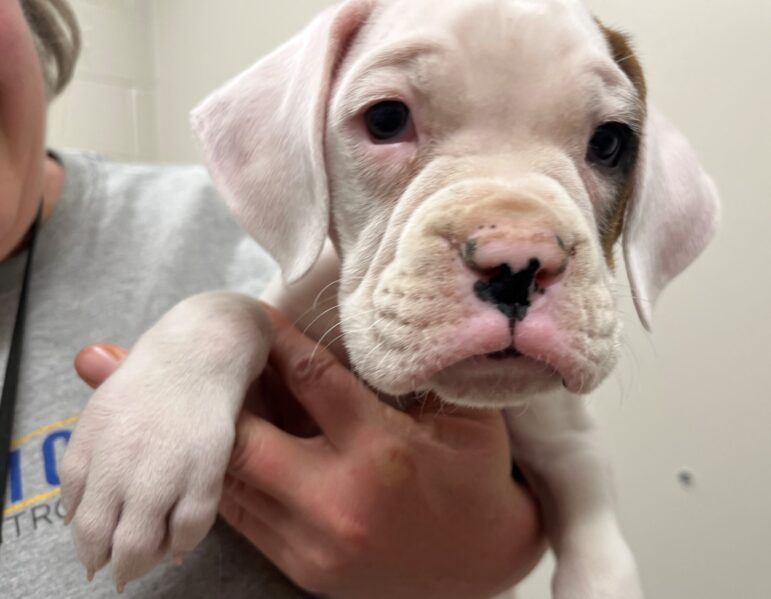
Brandy Muz
Minkus the boxer is held by Roxann Wilkinson, residing in her office in the Ingham County Animal Control and Shelter.MASON – One in five households nationally adopted pets during the COVID epidemic. With the lockdown, life changed not only for the humans, but also for the animals around them.
For Debbie and Jesse Hodges, foster parents to various animals over the years, that looked like raising a litter of bull mastiff puppies born right at the start of the pandemic. Debbie Hodges said, it “gives you something to do, a little bit of self-worth.”
A loss in the family early in lockdown compounded the Hodges’ challenge of a half dozen puppies and a major world event. Of the 10 puppies born, five survived.
“I kinda latched onto the puppies,” Debbie Hodges said. “You have to get up, you have to move, you have to take them on a walk.”
Animal shelters face struggles, as well. Ingham County Animal Control and Shelter in Mason had to temporarily close in 2020 due to COVID lockdown regulations. The shelter sent out a plea for residents to open their homes to animals with no place to go.
Heidi Williams, director of Ingham County Animal Control said. “We got all but a couple dozen animals placed in 48 hours. A lot of (foster) homes ended up just keeping them.” The solution had consequences.
“Animals helped us, but we didn’t really help them.”
Heidi Williams
“We’re seeing a lot of what we like to call ‘pandemic puppies,’ Williams said. They didn’t get good socialization, they didn’t get out into the public. So, we’re seeing some behavioral issues.” Williams said.
Even in good times, animals have difficulties adjusting to the shelter. Most dogs 9-18 months old are returned due to what Williams calls their “naughty teenage years.” She sympathizes with these owners, raising a puppy herself. “I have one that’s in that phase right now, they’re absolute hellions. But if you can make it through it, it’s so worth it.”
“We started a program called Fear Free Sheltering, this includes trying to reduce the anxiety, stress and frustrations of the animals while they’re with us.” Williams said dogs need 18 hours of sleep, and get around 12 in the shelter, “When I get sleep deprived, I’m cranky, and nobody’s gonna wanna adopt me.”
Trying to make their animals more well-adjusted, the shelter has aimed to make the pets’ time in the facility a better experience for when they’re adopted. Hiring an enrichment coordinator right as the pandemic began helped.
Roxann Wilkinson, the shelter’s behavioral and enrichment coordinator said things haven’t returned to normal as everyone had hoped. “We’re seeing economic issues. The number of adoptions and intakes, there’s nothing we can compare it to. It’s wreaking havoc on my statistics.”
Wilkinson said said she was not able to account for every pet people adopted in Ingham County in the pandemic. “People would find strays and keep them, it was an unprecedented time.”
Williams says she hopes for a future beyond COVID-19, noting that the rapid increase of pregnant animals contributed to overpopulation in the shelter’s kennels and cages.
Williams said the shelter aims to start a free trap, neuter and release program next year. Until then, she said, people can contact the animal shelter for advice on low-cost spay and neuter options.
Debbie Hodges is thankful for the joy that the bull mastiff puppies brought. “People found themselves at home with more time. The pandemic really isolated all of us from human contact.” She said the puppies eventually adopted into loving homes, “People were looking to fill that void and those animals were able to do just that.”